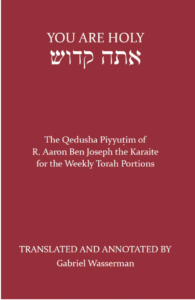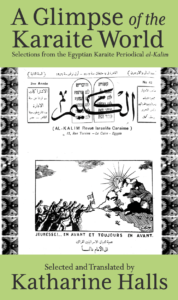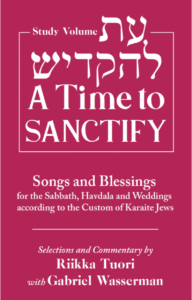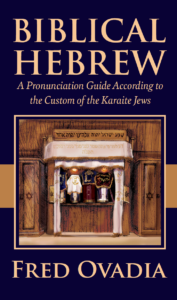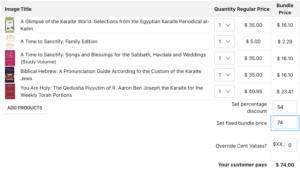
Get these 5 books for $74 at TheKaraitePress.com
Hello! It has been too long. I actually completely lost my blogging voice. I am not sure whether it is going to come back and if so, in what fashion it will take. But I have not lost my love to preserve and bring to light Karaite literature. Today, I am going to provide a quick overview of five new books available at TheKaraitePress.com. You can buy all five new books for $74.00 at TheKaraitePress.com (just click on any of these titles and add the bundle to your cart).
First, if everyone who reads this post buys one of these new books (any one!) we will have enough money to run The Karaite Press for next year. And we have some AMAZING books in store for next year. This bundle has free shipping in the United States – unfortunately, we cannot offer free shipping abroad.
Watch this video for my super quick take on all five books.
BTW, in the in the video, you’ll hear me slip into a non-Egyptian Arabic pronunciation – Najib – as opposed to the standard Egyptian – Nagib. Of course, none of my pronunciation is close to standard Egyptian Arabic.
You can click on any of the products below and select the bundle and the price will automatically calculated at checkout. Note: These book are on pre-sale. They and any books purchased with them are not expected to ship till September 24, 2023
Aaron ben Joseph was a central figure in medieval European Karaite Judaism. He was the redactor of the Karaite prayer book, and authored piyyutim, that is, poems used in the service, in that prayer book. Aaron ben Joseph was also a Biblical commentator, whose commentary shows deep knowledge of both Karaite and Rabbanite sources. His knowledge of both Karaite and Rabbanite texts enabled him to weave these traditions into his piyyutim as well.
Each poem discusses the content of the weekly Torah portion and concludes by introducing one of the Biblical verses from the qedusha, which declare God’s sanctity. These poems are still recited today in Karaite synagogues, and this volume sheds light on the substance and poetic structure of these poems.
Al-Kalim first appeared in February 1945 and published twice monthly, apart from summer breaks, until it tailed off and finally folded in 1956. Much of the magazine’s coverage was devoted to Karaite communal politics. But politics and current affairs were by no means al-Kalim’s staple content. Articles on Jewish history, religious practices and holy texts appeared in virtually every issue, and the Hakham Akbar or Grand Hakham Tubiyah Simhah Lifi Babufitsh (Toviyyah ben Simhah Levi Babovitch) regularly contributed interviews or essays. With its wide-ranging subject matter, al-Kalim is a compendious resource for the study of the Karaites in Egypt during the 1940s and ’50s.
A TIME TO SANCTIFY features twenty songs written by nineteen Karaite authors, most of whom lived in the region of the Pale of Settlement, encompassing Poland and Lithuania, between the sixteenth and the early nineteenth centuries.
This Study Volume contains full translations of these songs, replete with analysis and commentary in order to elucidate the poetic, philosophical and theological references within them. This edition also provides a brief biography of the authors of these songs, placing them in their historical context.
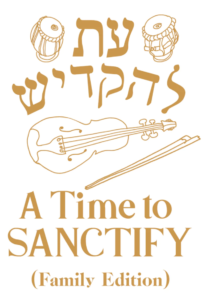 A TIME TO SANCTIFY is a first of its kind songbook (zimron or bentcher) specifically designed for English speaking Karaites. In addition to blessings for Shabbat, havdala and weddings, this work features selections from twenty songs written by nineteen Karaite authors, most of whom lived in the region of the Pale of Settlement, encompassing Poland and Lithuania, between the sixteenth and the early nineteenth centuries.
A TIME TO SANCTIFY is a first of its kind songbook (zimron or bentcher) specifically designed for English speaking Karaites. In addition to blessings for Shabbat, havdala and weddings, this work features selections from twenty songs written by nineteen Karaite authors, most of whom lived in the region of the Pale of Settlement, encompassing Poland and Lithuania, between the sixteenth and the early nineteenth centuries.
Please note that due to an error, the Friday evening blessings for wine and bread (which would have appeared at the end of the Friday evening Kiddush on page 11) were omitted. These same words appear on the bottom of page 16, beginning with Uvaruch Elohenu.
This book methodically sets forth rules for reading Biblical Hebrew. Novices and experts alike will benefit from the organized presentation of a comprehensive set of principles. Upon completion of the material in this book, readers will have fluency of pronunciation according to the Egyptian Karaite pronunciation tradition.

